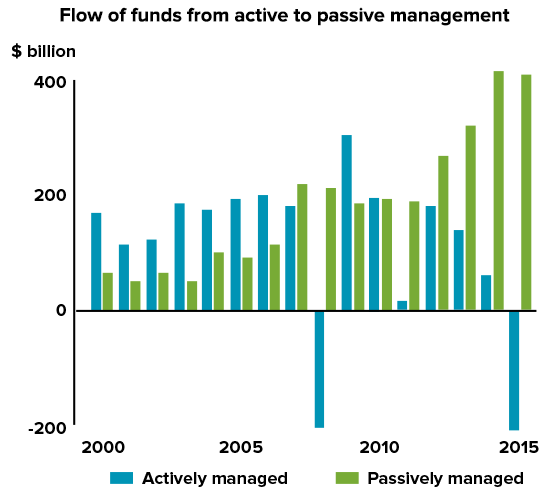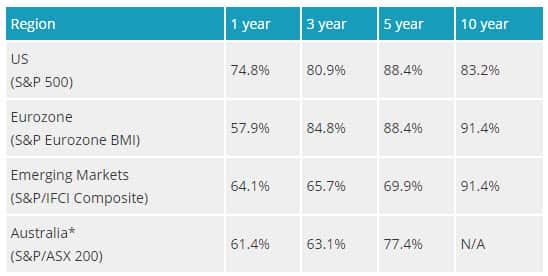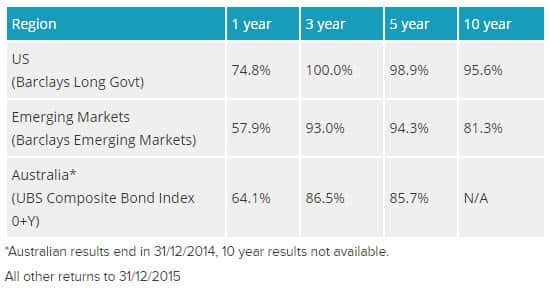The latest data for active funds returns does not bode well for traditional active fund managers. Standard & Poor’s (S&P) SPIVA report for 2015 is the clearest indictment yet for traditional active management, revealing that close to 90% of fund managers have underperformed over 10 years after fees.
More recently, 2015 proved to be one of the worst years on record for active managers, who failed to cushion the effects of the stock market’s dip over the second half of the year.
Those who mention top-performing managers as evidence that indexing isn’t sensible are doing retail investors a terrible disservice. Although each year some active fund managers beat the indices, very few have consistently done so over the long term. Those who do well over 1 and 3 years usually do poorly over longer periods as their styles and the market factors that have served them well (value, growth etc) mean-revert.
Warren Buffett recommends index funds
Famed investor Warren Buffett agrees and has been a strong advocate of index funds since the 1990s.
Warren Buffett’s own company, Berkshire Hathaway, has underperformed the S&P 500 index for 5 of the past 6 years so his comments about passive investing have indeed proved correct.
With the flood of money that has poured into index management over the last 10 years, it has become even more difficult for active managers to outperform. As ‘less-skilled’ retail investors abandon active strategies and switch to ETFs and automated investing, the remaining competition is getting tougher and tougher. This means the trend is getting far worse for active fund managers. The trend to passive investing means there are fewer and fewer opportunities to exploit, leaving the remaining active fund managers to trade against themselves. That is simply a zero-sum game that nobody can win.
The trend to passive investing means there are fewer and fewer opportunities to exploit, leaving the remaining active fund managers to trade against themselves. That is simply a zero-sum game that nobody can win.

Source: Supplied
Active funds consistently lag the index
The scale of active managers’ latest underperformance should surprise even their most passionate defenders.
In their latest report, S&P exposed that more than half of actively managed funds underperformed their benchmark across all regions and assets, over 1 and 3 years. Longer-term results did not show any improvement with 5 and 10-year performance even more disappointing for active managers.
Despite lower risk, fixed interest (bond) fund managers produced similarly dismal results to share portfolio managers.
Our recent report uncovered similar results for Australian managers. Long-term fund performance was completely overwhelmed by the impact of fees, leading to the vast majority of managers underperforming the index over 5 years after fees.
According to S&P, between 81% and 96% of active fund managers across bonds and shares have underperformed their index over 10 years.
Percentage of active fund managers beaten by the index
Shares

Source: Supplied
Bonds

Source: Supplied
Why active fund managers underperform
Based on these results, some skeptics would suggest that active managers are just throwing darts, but in reality active investors are only getting smarter and better over time as more competition enters and technology progresses.
The paradox of skill means that as more sophisticated investors enter the marketplace, the capacity for outperformance will continue to shrink over time. And as skill improves, luck ironically becomes a much bigger factor in separating the winners from the losers.
In the 1970s it was much easier to beat the market simply because there was much less competition. Nowadays there are tens of thousands of well-paid stock analysts, fund managers, hedge funds and quant traders paid to ensure that any market opportunity is discovered an exploited within seconds.
In their book The Incredibly Shrinking Alpha, Larry Swedroe and Andrew Berkin succinctly explained why active funds management is getting more and more difficult:
What so many people fail to comprehend is that in many forms of competition, such as chess, poker or investing, it is the relative level of skill that plays the more important role in determining outcomes, not the absolute level.
Financial services is filled with smart people who have trouble admitting this to themselves – that being smart alone doesn’t always translate into market-beating results. Especially when there are thousands of others just like them.
Conclusion
The reality is simple: gross returns minus the costs of financial intermediation (brokerage, funds management etc) equals the net returns actually delivered to investors.
Since extra gross returns are much harder to come by these days, investors should be focusing on the 2 factors they can control – cost and risk. This is why our portfolios are invested entirely in low-cost passive index funds and our time is spent on asset allocation and risk management rather than stock picking.
It’s worth noting that despite the recent growth of index funds and ETFs, active funds still manage the majority of money in Australia by a wide margin. The adoption of passive investing in Australia still lags the US and Europe but is likely to accelerate over the next 10 years as more investor switch into ETFs and automated investment services.
Share

